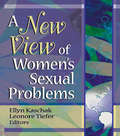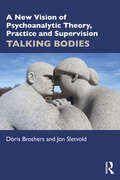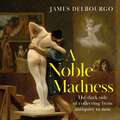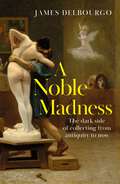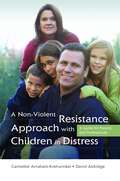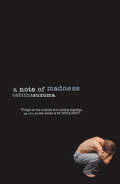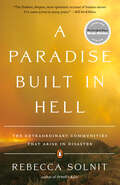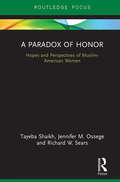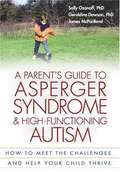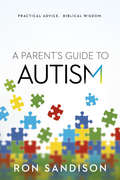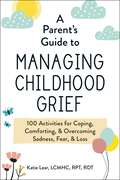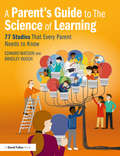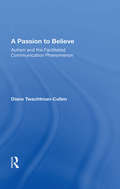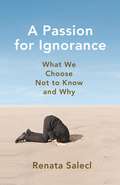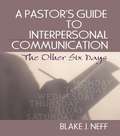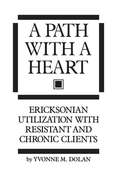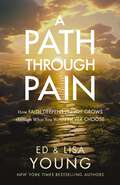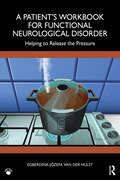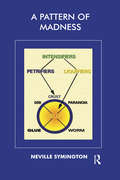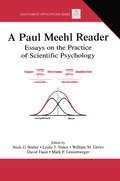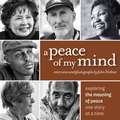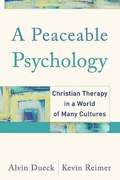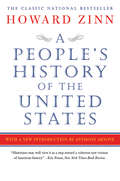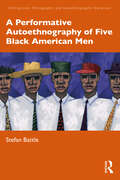- Table View
- List View
A New View of Women's Sexual Problems
by Leonore Tiefer Ellyn KaschakTake a new look at women’s sexuality!This fascinating book looks at the wide-ranging therapeutic, social, and political implications of the new paradigm of women’s sexuality. International in scope and multidisciplinary in approach, A New View of Women’s Sexual Problems examines the theoretical and practical effects of the landmark document produced by the Working Group on a New View of Women’s Sexuality. The book brings together gender theory, psychology, social science, and medicine in a powerful cultural critique of the reigning medical approach to women’s sexual health. International experts from India, Costa Rica, Israel, the US, and many other cultures place this revolutionary idea in cultural and political context, as well as extrapolating fresh new treatment options for dealing with women’s sexual problems.A New View of Women’s Sexual Problems analyzes the new paradigm’s implications in many fields, including: family medicine couples counseling for straight and lesbian partners STD prevention and sexual health issues sex therapy sex education feminist theory developmental psychology
A New Vision of Psychoanalytic Theory, Practice and Supervision: TALKING BODIES
by Jon Sletvold Doris BrothersBy viewing psychoanalysis through the lens of embodiment, Brothers and Sletvold suggest a shift away from traditional concept-based theory and offer new ways to understand traumatic experiences, to describe the therapeutic exchange and to enhance the supervisory process. Since traditional psychoanalytic language does not readily lend itself to embodied experience, the authors place particular emphasis on the words I, you, we and world, to describe the flow of human attention. Offering new insights into trauma, this book demonstrates how traumatic experiences and efforts to regain certainty in one’s psychological life involve profound disruptions of this flow. With a new understanding of transference, resistance and interpretation, the authors ultimately show how much can be gained from viewing the analytic exchange as a meeting between foreign bodies. Grounded in detailed case material, this book will change the way therapists from all disciplines understand the therapeutic process and how viewing it in terms of talking bodies enhances their efforts to heal.
A Noble Madness: The dark side of collecting from antiquity to now
by James Delbourgo'A magisterial rethinking of why we collect. I loved this book' Edmund de Waal'Magnificent . . . so compulsive and entertaining' Stephen Fry'Give it to the collector in your life, and watch sparks fly!' Cathy Gere'A delight to read and ponder' Jackson Lears'A tour de force of scholarship and storytelling' Daniel WeissA captivating history of obsessive collectors: from ancient looters and idolaters to fin de siècle decadents, Freudian psychos, and hoarders.Collectors are often praised for their taste in art or contributions to science, but there can be a darker side: their passion is sometimes driven by dangerous obsession. Roman emperors who lusted after statues; Chinese scholars obsessed with rocks and flowers; fin de siècle dandies surrounded by bibelots. History is full of stories about those who love things more than people, presenting a danger either to themselves or others. In this sweeping history from antiquity to today, James Delbourgo tells the extraordinary story of the mad collector as a cultural figure from the tyrant and idolater to the sexually repressed "psycho" of the Freudian imagination and the modern-day hoarder. His conclusion is surprising: Because they are driven by passion rather than profit, obsessive collectors also have been cultural heroes, seen as authentic and true to themselves. Some may be mad, but theirs is a noble madness.
A Noble Madness: The dark side of collecting from antiquity to now
by James Delbourgo'A magisterial rethinking of why we collect. I loved this book' Edmund de Waal'Magnificent . . . so compulsive and entertaining' Stephen Fry'Give it to the collector in your life, and watch sparks fly!' Cathy Gere'A delight to read and ponder' Jackson Lears'A tour de force of scholarship and storytelling' Daniel WeissA captivating history of obsessive collectors: from ancient looters and idolaters to fin de siècle decadents, Freudian psychos, and hoarders.Collectors are often praised for their taste in art or contributions to science, but there can be a darker side: their passion is sometimes driven by dangerous obsession. Roman emperors who lusted after statues; Chinese scholars obsessed with rocks and flowers; fin de siècle dandies surrounded by bibelots. History is full of stories about those who love things more than people, presenting a danger either to themselves or others. In this sweeping history from antiquity to today, James Delbourgo tells the extraordinary story of the mad collector as a cultural figure from the tyrant and idolater to the sexually repressed "psycho" of the Freudian imagination and the modern-day hoarder. His conclusion is surprising: Because they are driven by passion rather than profit, obsessive collectors also have been cultural heroes, seen as authentic and true to themselves. Some may be mad, but theirs is a noble madness.
A Non-Violent Resistance Approach with Children in Distress
by David Aldridge Carmelite Avraham-KrehwinkelParents, teachers and other professionals often struggle to know how to deal with disruptive, abusive or aggressive behaviour. This book addresses the urgent need for a realistic, practical and effective approach to dealing with severe disruptive behaviour in children and adolescents. Adapting the principles of non-violent resistance originally advocated by Mahatma Gandhi, the book provides de-escalation techniques which empower the adult and unburden the distressed child. The authors outline the theoretical basis upon which the approach was developed, and explain how and why it can be so effective. Case studies demonstrate how the approach can be used to reach more successful places with unhappy and disruptive children of different ages. A separate section for parents provides useful advice on how to take the theoretical material and use it to deal with problematic behaviour in everyday life. As effective as it is original, this approach will empower desperate parents and despairing caregivers by equipping them with hands-on tools to contain, counter and positively direct the aggression and opposition which they face from children in distress.
A Note Of Madness
by Tabitha SuzumaLife as a student is good for Flynn. As one of the top pianists at the Royal College of Music, he has been put forward for an important concert, the opportunity of a lifetime.But beneath the surface, things are changing. On a good day he feels full of energy and life, but on a bad day being alive is worse than being dead. Sometimes he wants to compose and practise all night, at other times he can't get out of bed. His flatmate Harry tries to understand but is increasingly confused by Flynn's erratic mood swings. His friend Jennah tries to help, but Flynn finds it difficult to be around her as he struggles to control his feelings and behaviour. With the pressure of the forthcoming concert and the growing concern of his family and friends, emotions come to a head. Sometimes things can only get worse before they get better.
A Paradise Built in Hell: The Extraordinary Communities That Arise in Disaster
by Rebecca Solnit"The freshest, deepest, most optimistic account of human nature I've come across in years. " -Bill McKibben The most startling thing about disasters, according to award-winning author Rebecca Solnit, is not merely that so many people rise to the occasion, but that they do so with joy. That joy reveals an ordinarily unmet yearning for community, purposefulness, and meaningful work that disaster often provides. A Paradise Built in Hell is an investigation of the moments of altruism, resourcefulness, and generosity that arise amid disaster's grief and disruption and considers their implications for everyday life. It points to a new vision of what society could become-one that is less authoritarian and fearful, more collaborative and local. .
A Paradox of Honor: Hopes and Perspectives of Muslim-American Women (Researching Social Psychology)
by Richard W. Sears Tayeba Shaikh Jennifer M. OssegeBased on original interviews of 22 Muslim-American women of South Asian descent on the topics of honor and honor killings, this book examines honor and culture, and their intersections with power, tradition, gender, family, and religion. Additionally, it incorporates an autoethnographic approach describing the author’s journey to Pakistan to create a personal narrative throughout. This volume offers a unique perspective that allows for informed exploration and description of Muslim-American women’s attitudes and beliefs surrounding the practice of killing women and girls in order to regain family honor.
A Parent's Guide to Asperger Syndrome & High-Functioning Autism: How to Meet the Challenges and Help Your Child Thrive
by Sally Ozonoff Geraldine Dawson James McpartlandEmphasizing how to build on the talents and strengths of a high-functioning autistic child, it contains many useful case histories along with scientific and practical information.
A Parent's Guide to Autism: Practical Advice. Biblical Wisdom.
by Ron SandisonThis guide will help readers have an in-depth understanding of autism, and provide a plan for parents to raise happy, healthy children. One in every sixty-eight children will be diagnosed with autism. More children will be diagnosed with autism than with AIDS, diabetes, and cancer combined. This means every year in America sixty thousand families will receive the diagnosis that their precious son or daughter has an autism spectrum disorder. With diagnosis at such an alarming rate, how can parents be equipped to confidently raise children with autism? All children can flourish and mature through love.A Parent&’s Guide to Autism offers interviews from forty experts, exclusive teaching on bully-proofing children, as well as practical wisdom, biblical knowledge, and life experiences from Ron Sandison. He compassionately shares his own personal struggles with overcoming autism as a minister and professional in the medical field to help parents raise outstanding children.
A Parent's Guide to Managing Childhood Grief: 100 Activities for Coping, Comforting, & Overcoming Sadness, Fear, & Loss
by Katie LearHelp your child navigate feelings of sadness and loss with 100 unique, activity-based approaches that help them manage their childhood grief in a healthy and constructive way.The loss of a loved one is a complex, confusing experience for a child to understand. Children may struggle to express, process, and manage their complicated and conflicting feelings, whether the loss is a parent, grandparent, sibling, or even a pet. So, what should you do to help your child process their sadness, loss, and frustration in a more healthy, positive way? In A Parent&’s Guide to Managing Grief, you&’ll learn everything you need to know about how children grieve and what you can do to support them during their most difficult moments. From there, you&’ll find 100 activities that you can use in a group setting, activities that you (or another caregiver) can do alone with your child, and ways to make the most of virtual interactions to support a grieving child. Explore activities like: -Making a scream box -Playing with clay -Feelings charades game -Making a memory bracelet -And many more! It can feel difficult to connect with your child as you process your own complicated emotions surrounding loss. Use these activities to help bridge the gap between you and your child and to help you both find comfort in a difficult situation. You&’ll find all the tools you need to help your child (and even yourself) healthily process your grief and move towards happiness, understanding, and acceptance together.
A Parent’s Guide to The Science of Learning: 77 Studies That Every Parent Needs to Know
by Edward Watson Bradley BuschSupporting parents in the quest to help their children learn as effectively and efficiently as possible, A Parent’s Guide to The Science of Learning translates 77 of the most important and influential studies on student learning into easily digestible overviews. This book will develop parents’ understanding of crucial psychological research so that they can help their children improve how they think, feel and behave in school (and, indeed, in life). Each overview summarises the key findings from the research and offers tips, hints and strategies for how you can use them in your home. Covering important areas such as memory, motivation, thinking biases and parental attitudes, this book makes complicated research simple, accessible and practical. From large- to small-scale studies, from the quirky to the iconic, this book breaks down key research to provide parents with the need-to-know facts. Essentially, it is a one-stop shop that offers guidance on how to parent even better. A Parent’s Guide to The Science of Learning answers the sort of questions that every parent wants to know but doesn’t know where to find the answers. This includes the small, everyday questions through to the big, life-changing ones. Some of the questions answered in this book include: How much sleep does your child need? Should I actually help them with their homework? Why does my child forget what they have just learnt? How much screen time is too much? What can I do to help them do better at school? Is it really that important that we all eat meals together? How can I help my child learn to better manage their emotions? How can I encourage them to be a better independent learner? A hugely accessible resource, this unique book will provide parents with the knowledge they need to best support their children’s learning and development.
A Passion To Believe: Autism And The Facilitated Communication Phenomenon
by Diane Twachtman-CullenThis book lays the foundation for the qualitative investigation into facilitated communication (FC). It addresses the contextual world of FC, and examines some of FC's most controversial issues. It takes a penetrating look at the FC culture and the forces that shape it.
A Passion for Ignorance: What We Choose Not to Know and Why
by Renata SaleclAn original and provocative exploration of our capacity to ignore what is inconvenient or traumaticIgnorance, whether passive or active, conscious or unconscious, has always been a part of the human condition, Renata Salecl argues. What has changed in our post-truth, postindustrial world is that we often feel overwhelmed by the constant flood of information and misinformation. It sometimes seems impossible to differentiate between truth and falsehood and, as a result, there has been a backlash against the idea of expertise, and a rise in the number of people actively choosing not to know. The dangers of this are obvious, but Salecl challenges our assumptions, arguing that there may also be a positive side to ignorance, and that by addressing the role of ignorance in society, we may also be able to reclaim the role of knowledge.Drawing on philosophy, social and psychoanalytic theory, popular culture, and her own experience, Salecl explores how the passion for ignorance plays out in many different aspects of life today, from love, illness, trauma, and the fear of failure to genetics, forensic science, big data, and the incel movement—and she concludes that ignorance is a complex phenomenon that can, on occasion, benefit individuals and society as a whole.The result is a fascinating investigation of how the knowledge economy became an ignorance economy, what it means for us, and what it tells us about the world today.
A Passion for Ignorance: What We Choose Not to Know and Why
by Renata SaleclAn original and provocative exploration of our capacity to ignore what is inconvenient or traumaticIgnorance, whether passive or active, conscious or unconscious, has always been a part of the human condition, Renata Salecl argues. What has changed in our post-truth, postindustrial world is that we often feel overwhelmed by the constant flood of information and misinformation. It sometimes seems impossible to differentiate between truth and falsehood and, as a result, there has been a backlash against the idea of expertise, and a rise in the number of people actively choosing not to know. The dangers of this are obvious, but Salecl challenges our assumptions, arguing that there may also be a positive side to ignorance, and that by addressing the role of ignorance in society, we may also be able to reclaim the role of knowledge.Drawing on philosophy, social and psychoanalytic theory, popular culture, and her own experience, Salecl explores how the passion for ignorance plays out in many different aspects of life today, from love, illness, trauma, and the fear of failure to genetics, forensic science, big data, and the incel movement—and she concludes that ignorance is a complex phenomenon that can, on occasion, benefit individuals and society as a whole.The result is a fascinating investigation of how the knowledge economy became an ignorance economy, what it means for us, and what it tells us about the world today.
A Pastor's Guide to Interpersonal Communication: The Other Six Days
by Blake J. NeffImproving your powers of communication can encourage powerful communication with your parishioners. A Pastor’s Guide to Interpersonal Communication: The Other Six Days provides students preparing for the pastoral ministry with specialized training in communications that focuses on the kind of one-on-one conversations they can expect to have with their parishioners. This comprehensive book examines a variety of essential topics, including perception, self-disclosure, verbal and nonverbal messages, listening, stages of relational development, power assertiveness and dominance, conflict management, forgiveness, persuasion, dual relationships, pastoral family communication, and how to develop a communications model. Each chapter includes “Pastoral Conversations,” real-life dialogues presented for analysis; “Key Concepts” for quick student review; “Meanings Mania,” self-tests on vocabulary; and “Unleashing the Power of Interpersonal Communication,” student exercises that reinforce the practical aspects of key principles. While many pastors have a great love for the people they minister to, they have difficulty demonstrating that love because they lack the skills to develop and maintain relationships. This book explores how communication works and how to make it work for you, applying the best available interpersonal communications techniques to your relationships with the real people of the church—your parishioners. A Pastor’s Guide to Interpersonal Communication: The Other Six Days examines: how self-disclosure works and when it’s appropriate for a pastor stumbling blocks and building blocks for effective listening the differences between power, assertiveness, and dominance and when to use each conflict management styles and negotiation strategies several myths about forgiveness dual relationships and how to avoid them pitfalls to avoid in pastoral family communication and much more A Pastor’s Guide to Interpersonal Communication: The Other Six Days is an essential resource for Bible college students and for students at the pre-ministerial and seminary levels. It’s also a valuable professional tool for clergy practitioners who need help with their communication skills.
A Path With A Heart: Ericksonian Utilization With Resistant and Chronic Clients
by Yvonne M. DolanFirst published in 1993. Routledge is an imprint of Taylor & Francis, an informa company.
A Path through Pain: How Faith Deepens and Joy Grows through What You Would Never Choose
by Ed Young Lisa YoungIn the midst of deep pain, how can you move forward?Most of us spend our lives avoiding pain at every turn, so when we inevitably experience it, it sends us into a tailspin. We begin to question why God doesn't stop bad things from happening, if there's significance in our pain, and whether or not God is truly worthy of our trust or actually cares about us.Ed and Lisa Young, bestselling authors and pastors of Fellowship Church, know the kind of pain most of us hope never to experience--the death of a child. With refreshing vulnerability and power, A Path through Pain shares their family's journey from sorrow and anger to hope and healing after the tragic and sudden loss of their daughter. As they share their incredible perspective, they will inspire and equip you to:See God's presence, love, and care in the middle of your sufferingBelieve that there is purpose in your pain, even if you can't see that purpose yetRebuild your life after a season of painRestore your trust in God and the world you live in God really does care for us, and in the darkest of places, his light still shines to show us a way through.
A Patient’s Workbook for Functional Neurological Disorder: Helping To Release the Pressure
by Egberdina-Józefa van der HulstThis self-help workbook offers guidance for people coping with functional neurological disorder (FND), as well as their partners, families, friends, and healthcare professionals. It uses a visual metaphor based on the groundbreaking new Pressure Cooker Model to help you understand the condition and to reduce the symptoms. Firmly rooted in neuropsychological principles, this model is practical and relatable, bridging the gap between theoretical and clinical models of FND.The Pressure Cooker Model focuses on the person with FND, as well as the contribution of the person’s environment, interactions, relationships, and surroundings to FND, and looks to improve recovery, reduce stigma and increase FND awareness, providing a radical shift in thinking about FND. Grounded in neuropsychology, this book helps people understand their FND triggers, as well as their emotional and physical symptoms, and offers many strategies for self-care and building healthy relationships.The book is accompanied by an extensive set of entirely free online resources and templates to help people with FND manage a range of genuine and disabling functional neurological symptoms, from motor symptoms (such as tremors, functional weakness, and gait difficulties, to sensory symptoms such as tingles and numbness, and cognitive symptoms such as memory and concentration difficulties or brain fog, and dissociative seizures. It is valuable reading for anyone with FND, their partners, families, and friends, as well as healthcare professionals in any field working with people with FND.
A Pattern of Madness: Philosophical Foundations For A Theory Of Madness
by Neville SymingtonAuthor of many respected psychoanalytic works including Narcissism: A New Theory, Emotion and Spirit, Making of a Psychotherapist and Spirit of Sanity, the distinguished psychoanalyst Neville Symington's latest book expands, refines and deepens what has become an ever more impressive, far-reaching and absorbing inquiry into the nature of madness and sanity. It is Symington's central contention that the core psychopathology of our times can be identified and designated as narcissism, although self-centredness, egoism or solipsism might serve equally well. Critical of psychiatry's mere symptomatology, and of much psychotherapeutic practice as superficial and sterile, the present volume probes compellingly into the narcissistic pattern in an effort to delineate its structure in all its complexity and thereby gain a measure of perspective and distance from this most intractable of psychic states.
A Paul Meehl Reader: Essays on the Practice of Scientific Psychology (Multivariate Applications Series)
by Niels G. Waller Leslie J. Yonce William M. Grove David Faust Mark F. LenzenwegerThis new book introduces a new generation to the important insights of Paul Meehl. In addition to selected papers from the classic reader, Psychodiagnosis, this book features new material selected from Meehl's most influential writings. The resulting collection is a tour de force illustrating quantitative analysis of life science problems, an examination of the inadequacy of some methods of analysis, and a review of the application of taxometrics.A Paul Meehl Reader is organized into five content areas: theory building and appraisal - how we discover and test the true causal relations of psychological constructs; specific etiology - an examination of genetic, behavioral, and environmental etiology in psychopathology; diagnosis and prediction - a review of the appropriate use of base rates; taxometrics - a look at Meehl's development of the method he invented; thinking effectively about psychological questions - a critique of correlation research and the power of quantitative thinking in psychology.The Reader features section introductions to orient the reader and provide a context and structure for Paul Meehl's work. The section on diagnosis and prediction features problem sets with solutions to guide the reader through practical applications of the principles described. Accompanying downloadable resources contain footage from Paul Meehl's engaging seminar on clinical versus statistical prediction. This book appeals to advanced students and professionals in psychology, sociology, law, education, human development, and philosophy.
A Peace of My Mind: Exploring The Meaning of Peace One Story at a Time
by John NoltnerThis book is a collection of diverse experiences of people from many different parts of the world filled with revelations of courage,commitment, resilience and hope.
A Peaceable Psychology: Christian Therapy in a World of Many Cultures
by Alvin Dueck Kevin ReimerIn the past century psychology has been practiced in the manner of medical science, working from the assumption that therapy can transcend particular traditions. Seeking to move the conversation forward, Alvin Dueck and Kevin Reimer argue for a theologically, culturally, and politically sensitive psychotherapy whereby the Christian psychologist treats the patient according to the particulars of the patient's political situation and ethnic and religious tradition, while acknowledging the role of his or her own Christian story in therapeutic dialogue. A Peaceable Psychology encourages mental health practitioners to mine their own traditions for gifts of healing and to allow clients to bring their native ethnic or religious voice into therapy. The authors point to the life of Jesus as the foundation on which to build a therapeutic ethic, appropriating the story of his life to bring healing. This integrative work considers philosophy, ethics, theology, and cognitive science in making an argument on behalf of and for the psychological community. It will benefit psychology professors and students, Christian psychologists and psychotherapists, mental health workers, pastors, and theologians.
A People's History of the United States: 1492-present (P. S. Series #1)
by Howard ZinnTHE CLASSIC NATIONAL BESTSELLER"A wonderful, splendid book—a book that should be read by every American, student or otherwise, who wants to understand his country, its true history, and its hope for the future." –Howard FastHistorian Howard Zinn’s A People’s History of the United States chronicles American history from the bottom up, throwing out the official narrative taught in schools—with its emphasis on great men in high places—to focus on the street, the home, and the workplace.Known for its lively, clear prose as well as its scholarly research, it is the only volume to tell America's story from the point of view of—and in the words of—America's women, factory workers, African-Americans, Native Americans, the working poor, and immigrant laborers. As Zinn shows, many of our country's greatest battles—the fights for a fair wage, an eight-hour workday, child-labor laws, health and safety standards, universal suffrage, women's rights, racial equality—were carried out at the grassroots level, against bloody resistance. Covering Christopher Columbus's arrival through President Clinton's first term, A People's History of the United States features insightful analysis of the most important events in our history. This edition also includes an introduction by Anthony Arnove, who wrote, directed, and produced The People Speak with Zinn and who coauthored, with Zinn, Voices of a People’s History of the United States.
A Performative Autoethnography of Five Black American Men (Writing Lives: Ethnographic and Autoethnographic Narratives)
by Stefan BattleIn this book, Stefan Battle weaves together autoethnographic narrative and ethnographic performance material from his own life and those of four other Black men, to show the untold impact of racial trauma on these everyday lives. By engaging readers with these experiences, stories, and pain, the book aims to help to stop racial trauma and heal the race-based grief of the many Black men who need to speak out against racial injustice United States. Battle organizes the book as a performative account of a one-day workshop that he might teach to college students or other adults. He uses individual activities including an interview with a White woman regarding her relationship to race and racism, a staged reading in which five Black men share their stories, an audience discussion about race and racism, and Battle’s performative talk, sharing the author’s desire for people of all races, to self-reflect and then talk among themselves about race and racism. Battle’s powerful book reveals that each Black man’s unique story is important and that understanding something of a person’s hidden context for processing the traumas of racism can lead to new understanding and healing. To this end, Battle examines issues such as Black men's mental health and the wider societal systemic racism in the US that provokes tension and harm to the racial victimization of Black men. Suitable for students and scholars of qualitative research and autoethnography in the social sciences, communication studies, education, social work, and Africana or Black studies, this book will also be of interest to anyone seeking to better understand and engage with the Black male experience in the US.
